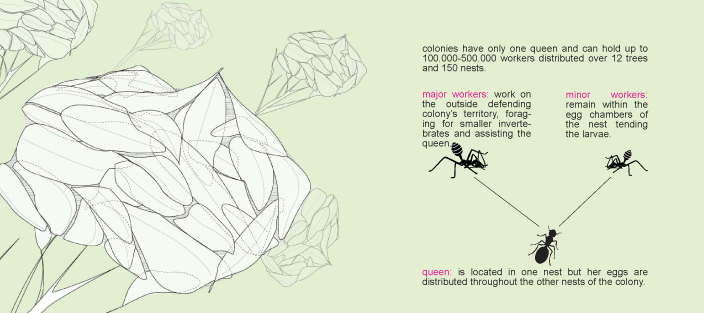
 |
 |
 |
 |
 |
HABITAT: Oecophylla smaragdina only lives in the Australian rainforest that has
an average temperature of 28°C, and a 70-80% humidity range for 120 days and
with about 2 m of rainfall a year.
Winter (19°C): The colony builds many little nests high up in the trees to get as
much as heat as possible.
Summer (30°C): ants build fewer but larger nests inside the canopy for protection
against heat and storms.
Nests are built in less then 24 hours, and last 8-10 weeks; even if they are
waterproof, a colony continuously builds new nests to replace old dead or
damaged ones. Leaves and ants live in symbiosis exchanging O2 and CO2 DESIGN: Food cultivation is one of the main reasons for rainforest deforestation. The ants sensitive adaptation and strong communal symbiosis to their habitat can be learned from. The basis for this project is a proposal for an edge condition to rainforests facing encroachment from urban centers that are expanding beyond their borders, provoking the disappearance of many species. This proposal offers an alternative solution by seeking to mediate human impact while providing platforms for cultivation. Suspended enclaves act in a manner similar to the ants nest and seek to have the same symbiotic relationship on the forest ecosystem. Seasonal farming is contained on elevated covered platforms suspended between emergent trees, above the forest treetops, well exposed to the sun. Taking advantage of the moist climate the canopy collects dew and irrigates the crops. Aerial walkways connect the platforms creating a productive and dynamic elevated farming community. |
||||
